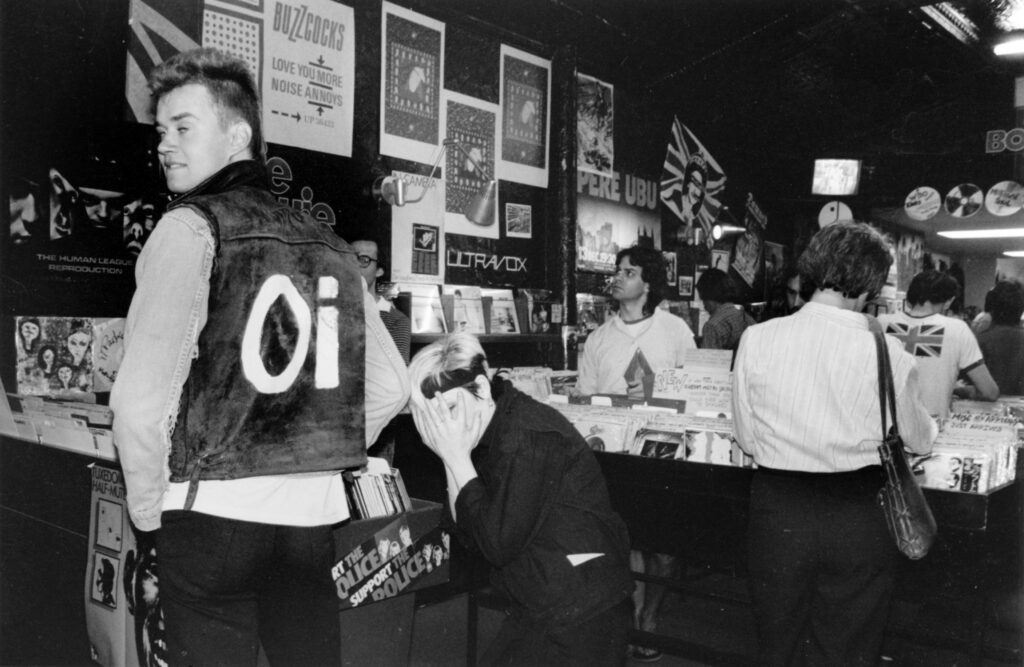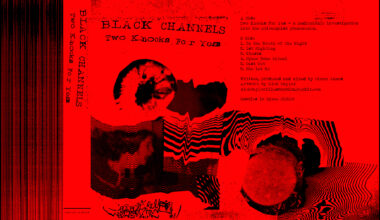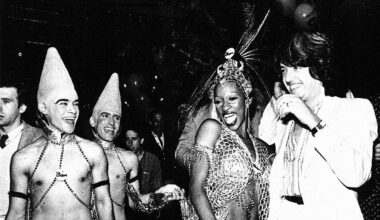‘Industrial accident: the story of Wax Trax! Records’ is a forthcoming documentary about… wait for it… Wax Trax! Records. It’s the story of one of the most exciting labels ever, an imprint that lodged its idiosyncratic brand of dark ‘n’ dirty electronic music deep into the American heartland
If ever there was a record label that deserved its story telling, it’s Wax Trax!, the Chicago home of industrial music of the 1980s. Founded by Jim Nash and Dannie Flesher, and starting out as a record shop in Denver, Colorado, in 1975, Wax Trax! gave the world Ministry, Revolting Cocks, Pailhead, My Life With The Thrill Kill Kult, and a slew of other sample heavy electronic punk outfits that defined the underground of the era. In doing so, it built the pockmarked runway for the likes of Nine Inch Nails, as well as Gary Numan’s industrial synth reinvention.
When Trent Reznor was making his name with Nine Inch Nails and delivering his own bon mots for the British music press, he described NIN as synth faggots, which makes for a pretty good description of much of Wax Trax!’s output – outside the mainstream, sexually ambiguous, electronic at heart, and avowedly confrontational. The label was ‘Brokeback Mountain’ gay, drunk cowboy, fetish-hetero gay. From the off, it was transgressive, erratic and drug-fuelled, and when it became a label as well as a record shop in the early 1980s, it employed the insane business model favoured by many other independent imprints of the day, with no written contracts (not even verbal agreements) and very little budget control.
It’s two decades since Wax Trax! ceased operations, but a fascinating documentary about the label is heading to a screen near you shortly. ‘Industrial Accident: The Story Of Wax Trax! Records’ is produced by Jim Nash’s children Julia and Aaron, leaning on their own testimony and that of various former staff members of both the shop and the label, as well as assorted band members. There’s lots from the Wax Trax! archives too, some of which the film shows being rescued from a barn in Arkansas, where Dannie Flesher had dumped it when he abandoned the music business in the late 1990s. He headed back to his home state when he knew he was dying from AIDS, the same condition that took Jim in 1995.
The newly unearthed grungy VHS footage catches the two label bosses hanging out with their artists, smoking spliffs, attacking one another, and generally having a great time, all long before the company ran into difficulties and Jim’s health started to fail. It’s a poignant eulogy to young lives lived fast.
It’s the two founders who make the Wax Trax! story so compelling. Lovers as well as business partners, Jim was a mercurial and wired character, capable of monumental acts of madness, while Dannie was sweet-natured and steady. The pair met in 1972 – “We went to a David Bowie concert,” says Dannie in the film – and forged a friendship from their mutual admiration of leftfield British music like Bowie and Roxy Music. When they fell in love, it caused something of a problem because Jim was married with two children.
Jim announced to his wife that he was gay and he was going to leave (“Because you don’t have a dick,” one commentator claims he said). It’s testament to his charm and essential decency that his ex-wife, the mother of Julia and Aaron, talks fondly about him in the film, but it’s clear he could be unhinged at times. Julia recounts a tale from her childhood when her dad and Dannie drove her and her brother through Chicago’s red light district in a van at night. At one point, Jim demanded that Dannie stop, and when a prostitute came over to start negotiating, the kids were told to throw open the door of the van and introduce themselves. Even for the 1970s, that was a pretty outré gag.
The Wax Trax! label was built on the foundation of the record shop, which relocated from Denver to Chicago at the end of 1978. The store stocked material from the growing catalogues of Rough Trade, Factory and other European indie imprints. It was one of the few places in the USA where you could score a copy of the Kleenex EP in 1978 or later pick up the early Joy Division and Bauhaus releases. Through its growing mail order operation, Wax Trax! provided a lifeline to young people stranded in one-horse towns all over the country. It was a pop culture sanctuary for the people considered freaks and weirdos in Ronald Reagan’s America. They brought cool bands to Chicago too, including the Ramones, who announced Wax Trax! to be best record store they had ever visited.
One of the shop’s regulars was Big Black frontman Steve Albini, who remembers the first Wax Trax! release proper in 1981, a 12-inch EP by Chicago punk band Strike Under. He talks about how the record “owned up to the fact that in Chicago, punks would go to dance clubs and dance”. And there perhaps is the key to the Wax Trax! sound, a collision of fuck-you punk attitude and the love of the dancefloor. The Strike Under EP was followed by the debut single from Divine, the already infamous counterculture cross-dressing performance artist, firmly establishing the label’s subversive streak and its love of outsiders. By the end of the 1980s, helped in part by licensing deals with various European imprints, they had nearly 300 releases under their belt. Ministry, Front 242, Minimal Compact, Revolting Cocks, Coil, The Young Gods, Laibach, Meat Beat Manifesto, KMFDM and Front Line Assembly all called Wax Trax! home.

A highlight of ‘Industrial Accident’ is Patrick Codenys and Richard 23 of Belgium’s Front 242 revealing their astonishment at getting signed by Wax Trax! after discovering they’d shifted tens of thousands of albums on licence. Selling leather-clad European electronic music to American audiences in the 1980s even now looks like a task unlikely to succeed, but succeed they did. And then went one step further by encouraging and enabling the creation of Revolting Cocks, an industrial supergroup featuring Richard 23, Luc Van Acker and Ministry’s Al Jourgensen, later augmented by Chris Connelly of Finitribe, which set a precedent for the label cooking up bands to unleash on the world. But it was Al Jourgensen, whose other side projects included 1000 Homo DJs, PTP, Acid Horse (with Cabaret Voltaire) and Pailhead (with Fugazi’s Ian MacKaye), who kept the label busy for years, even as Ministry themselves signed to Sire Records. It was Sire, it turns out, who paid for the Fairlight sampler that powered many of the Wax Trax! releases.
Also talking candidly on camera in the documentary is the delightful Groovie Mann (Frankie Nardiello) of My Life With The Thrill Kill Kult, a band put together specifically for Wax Trax! and for a while the biggest selling act on the label. Thrill Kill Kult’s brand of B-movie kitsch and stripper chic set to a punishing digital beat embodied the label’s trashy aesthetic, and Mann’s smiling and camp recollections of the Wax Trax! days are among the film’s best moments. He talks about how the band attracted numerous Satanists, loons from America’s badlands who would turn up at gigs having eagerly digested his scrawled album artwork, which featured all manner of half-baked nonsense lifted from 1960s horror movies. “I didn’t take any of it seriously,” says Mann. “I didn’t even… care!”
Jim Nash and Dannie Flesher’s grip on Wax Trax! weakened in the 1990s. The formalising of their relationships with labels like Play It Again Sam meant they were obliged to put out whatever PIAS released, which committed them to spending money on music they weren’t necessarily invested in emotionally. Core bands like Front 242 and Thrill Kill Kult were tempted away by major record deals and Wax Trax! started to lose money, eventually being taken over by TVT in 1992. When Jim died in 1995, Dannie walked away from the music business and moved back to his home state of Arkansas, where he remained until his death in 2010.
A year or so after Dannie died, Julia Nash organised a three-day festival of Wax Trax! music at The Metro in Chicago, and was overwhelmed by the reaction. The three dates sold out and the warmth of the audiences, whose lives had been shaped her father and Dannie’s work, convinced her that she needed to secure their legacy. She revived the Wax Trax! label, which has put out a handful of releases over the last half a dozen years, and focussed her energies on the production of the ‘Industrial Accident’ documentary.
There’s another story here, about how Wax Trax! introduced a new kind of queer culture to America by stealth, how a record company run by a gay couple secured a safe space for a generation of freaks and outsiders suffering in the small towns of America, with releases and tours that had an irresistible sense of reckless danger about them. Wax Trax! brought an avowedly hillbilly grittiness to the business of underground music, stripped it of intellectual justification, and was content to revel in its own fabulousness and outrage, funding artists who would otherwise have sunk without a trace. It helped define a sound and a set of values that still abide to this day.






